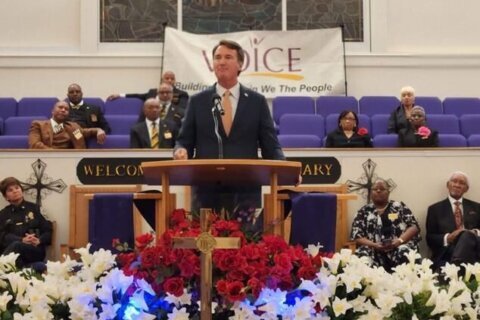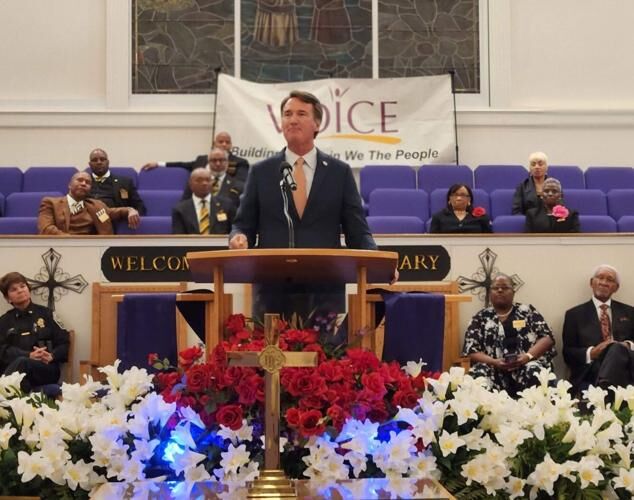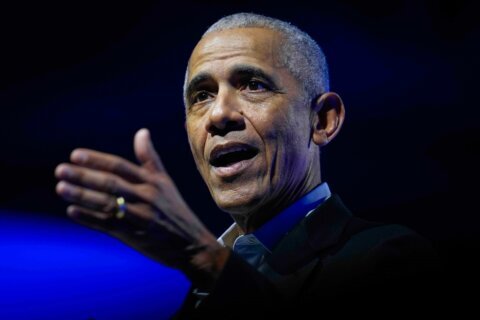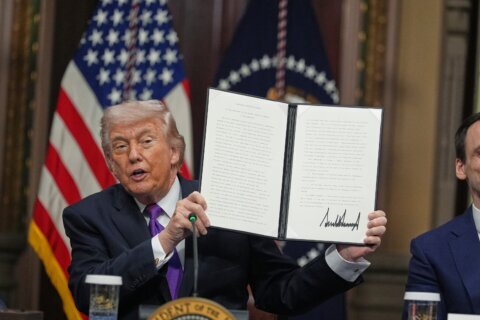This article was republished with permission from WTOP’s news partner InsideNoVa.com. Sign up for InsideNoVa.com’s free email subscription today.

This article was written by WTOP’s news partner InsideNoVa.com and republished with permission. Sign up for InsideNoVa.com’s free email subscription today.
There’s another pandemic facing young people.
That was the message from faith leaders, health officials and Gov. Glenn Youngkin at Mt. Zion Baptist Church in Triangle Sunday, as they gathered to discuss potential solutions to troubling behavioral health trends facing young people in Northern Virginia and beyond.
“We have another pandemic. It is the pandemic of behavioral health, and it affects everyone,” Youngkin said.
Sunday’s event was organized by VOICE, an interfaith coalition of religious communities and civic organizations in Northern Virginia. Members from dozens of houses of worship and community groups were in attendance, as well as public officials from Northern Virginia localities and school systems.
Amid the Christian, Jewish and Muslim prayers spoken from the Mt. Zion pulpit Sunday, Jennifer Wicker of the Virginia Hospital & Healthcare Association read some sobering statistics:
• Between 2018 and 2022, 12.4 per 100,000 Virginia teenagers died by suicide, above the national average of 10.9.
• Between October 2022 and March 2023, Northern Virginia saw a 10% increase in youth emergency room visits for opioid and other drug overdoses.
• The annual number of overdose deaths in Virginia has more than doubled 2015, reaching more than 2,500 in 2022.
At the same time, the levels of behavioral health staffing in the state continue to lag: 88 of Virginia’s 133 localities have no child or adolescent psychiatrist, many areas across the state lack crisis receiving centers, and hospital beds continue to fill up with patients in the midst of mental or behavioral health crisis without a better option for treatment.
Youngkin and the hundreds in attendance listened as Rev. Andra Hoxie of Faith A.M.E. Woodbridge told the story of a parent from her community driving home to find two ambulances for their two children who had overdosed.
“We are not seeking sympathy. We are looking for empathy,” she said.
Herndon Police Chief Maggie DeBoard discussed how law enforcement is increasingly coming into contact with young people in crisis.
Melissa Garcia from Dominion Hospital in Falls Church talked about the de-stigmatization that still needs to take place around issues of mental health.
And Kayla Bravo, a Virginia Commonwealth University student from Northern Virginia, told the story of her 19-year-old friend dying of a fentanyl overdose.
“It was absolutely heartbreaking. There is absolutely no excuse for the pain that has been brought to my generation and to our families,” Bravo said.
In response, Youngkin laid out his commitment: a comprehensive reform of the state’s behavioral health system and a pledge to make the issue his administration’s top priority over his remaining two-and-a-half years in the governor’s office.
The state budget includes over $430 million in incremental behavioral health funding for the current fiscal year, and he urged the General Assembly to reach an agreement on his new budget proposal, which would add another $230 million in funding for mobile crisis teams, school-based mental health programs and more. More than $50 million would also go to increasing the number of crisis receiving centers like the one Prince William County is set to open in Woodbridge next year, which Youngkin said would soon be the “best in the nation.”
“This isn’t a partisan moment. It’s a chance to say that there’s plenty of money in the system. We can pass a budget that can fund this and we can get going, because I don’t think Virginians should wait any longer,” Youngkin said.
He also committed to meeting with VOICE and other groups again in September to hear their specific requests for the fiscal 2025-26 budget.
“We look forward to meeting with Gov. Youngkin and his leadership team again in September to discuss our concrete proposals for additional reforms and funding, building off the important foundation provided by the Right Help, Right Now plan,” VOICE Co-Chair and Emmaus United Church of Christ pastor Kristen McBrayer told InsideNoVa, referencing the Youngkin administration’s name for his reform plan. “This issue is not going away. Tragically, there will be more overdose deaths, more suicides, and more youth mental health crises to come, and as a community we will have to repeatedly ask ourselves if we are ready for the hard work required to make change.”
On Thursday, it was reported that Youngkin’s administration had quietly removed LGBTQ+ youth resources from the Virginia Department of Health’s website. A 2022 Trevor Project survey found that nearly half of LGBTQ youth seriously considered attempting suicide last year.
Youngkin administration Press Secretary Macaulay Porter told the Washington Post the move was part of his emphasis on parents’ rights. VOICE declined to comment on the change to the VDH website, and it was not discussed Sunday.
Youngkin told the faith and community groups in attendance that it would take more than just the state government to help young people overcome the growing challenges they face. It would take faith communities, local governments, nonprofits and involved parents.
But as for his administration, he said, his priorities should be clear to everyone.
“Nobody should hear anything different,” Younkin said. “Top priority for what we’re going to do over the next two-and-a-half years is to transform our behavioral health system.”








